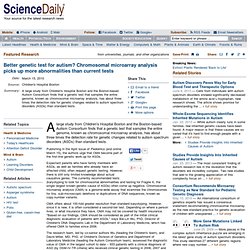

Asperger syndrome. Asperger syndrome (AS), also known as Asperger disorder (AD) or simply Asperger's, is an autism spectrum disorder (ASD) that is characterized by significant difficulties in social interaction and nonverbal communication, alongside restricted and repetitive patterns of behavior and interests.

It differs from other autism spectrum disorders by its relative preservation of linguistic and cognitive development. Although not required for diagnosis, physical clumsiness and atypical (peculiar, odd) use of language are frequently reported.[1][2] The syndrome is named after the Austrian pediatrician Hans Asperger who, in 1944, studied and described children in his practice who lacked nonverbal communication skills, demonstrated limited empathy with their peers, and were physically clumsy.[3] The modern conception of Asperger syndrome came into existence in 1981[4] and went through a period of popularization,[5][6] becoming standardized as a diagnosis in the early 1990s. Classification Causes. Karyotype Test. Analisi genetiche: Il Cariotipo - Fertilita.org, il portale della Fertilità e della Riproduzione Assistita. La citogenetica è lo studio dei cromosomi umani mentre l’analisi citogenetica consiste nello studio del numero e della struttura dei cromosomi (cariotipo) presenti nel nucleo delle cellule dell’organismo; è una procedura particolarmente importante nella diagnosi prenatale ma anche post-natale, per esempio in pazienti con ritardo mentale, difetti multipli alla nascita, sviluppo sessuale anormale, e in alcuni casi di infertilità o di aborto ripetuto.

Le analisi citogenetiche sono utili anche nello studio e nel trattamento di pazienti con tumori maligni e malattie ematologiche come la leucemia. Che cos’è un cromosoma I cromosomi sono costituiti da una molecola di DNA associata a numerose proteine, e contengono l’informazione genetica. Il numero di cromosomi per cellula è caratteristico di ciascuna specie; nella specie umana sono presenti 46 cromosomi (23 coppie) ogni cellula diploide. L’interpretazione del cariotipo standard. Better genetic test for autism? Chromosomal microarray analysis picks up more abnormalities than current tests. A large study from Children's Hospital Boston and the Boston-based Autism Consortium finds that a genetic test that samples the entire genome, known as chromosomal microarray analysis, has about three times the detection rate for genetic changes related to autism spectrum disorders (ASDs) than standard tests.

Publishing in the April issue of Pediatrics (and online March 15), the authors urge that CMA become part of the first-line genetic work-up for ASDs. Expectant parents who have family members with ASDs, as well as families who already have an affected child, often request genetic testing. However, there is still only limited knowledge about actual causative genes. The currently recommended tests (karyotyping to look for chromosomal abnormalities and testing for Fragile X, the single largest known genetic cause of ASDs) often come up negative. Aid4Autism. Ritalin (methylphenidate) How does it work?

Ritalin tablets contain the active ingredient methylphenidate hydrochloride, which is a type of medicine called a stimulant. It is used to treat attention deficit hyperactivity disorder (ADHD) in children. (NB. Methylphenidate tablets are also available without a brand name, ie as the generic medicine.) Stimulants are related to amphetamines, which might make them seem an odd choice for treating hyperactive children, because stimulants increase activity in the brain and normally make people more alert and active.
Methylphenidate works by affecting some of the natural chemicals that are found in the brain. Ritalin tablets are immediate-release tablets. What is it used for? Attention deficit hyperactivity disorder (ADHD). Methylphenidate is not used for all children with ADHD. The medicine can be continued into adolescence and adulthood if ADHD symptoms continue and you are still benefiting from the medicine. How do I take it? Warning! Use with caution in Not to be used in. Kim Stagliano.